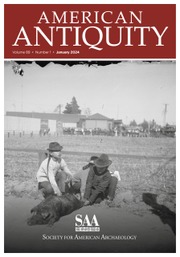Article contents
The Hinckley Figurines as Indicators of the Position of Utah Valley in the Sevier Culture*
Published online by Cambridge University Press: 20 January 2017
Abstract
Between 1956 and 1960, 20 ceramic figurines were discovered in Mound 42Ut111 at the Hinckley site west of Utah Lake in northern Utah. Circumstances of the discovery are discussed, as well as two other finds previously made in Utah Valley. Comparisons are made with figurines from the Fremont and Sevier areas, particularly from sites just north and south of Utah Valley. On the basis of these comparisons and a consideration of other items, such as ceramics, house type, and ecological setting, it is hypothecated that Utah Valley was a cultural center for northwestern Utah. It is proposed that this area be called the Provo culture area.
- Type
- Research Article
- Information
- Copyright
- Copyright © The Society for American Archaeology 1964
Footnotes
This paper was presented in shorter form at the 27th Annual Meeting of the Society for American Archaeology, May 3-5, 1962, Tucson, Arizona.
References
- 1
- Cited by


